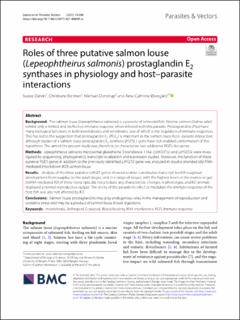Roles of three putative salmon louse (Lepeophtheirus salmonis) prostaglandin E2synthases in physiology and host–parasite interactions
Peer reviewed, Journal article
Published version
Permanent lenke
https://hdl.handle.net/11250/2760168Utgivelsesdato
2021Metadata
Vis full innførselSamlinger
- Articles [3016]
- Publikasjoner fra CRIStin [3074]
Originalversjon
10.1186/s13071-021-04690-wSammendrag
The salmon louse (Lepeophtheirus salmonis) is a parasite of salmonid fish. Atlantic salmon (Salmo salar) exhibit only a limited and ineffective immune response when infested with this parasite. Prostaglandins (PGs) have many biological functions in both invertebrates and vertebrates, one of which is the regulation of immune responses. This has led to the suggestion that prostaglandin E2 (PGE2) is important in the salmon louse host–parasite interaction, although studies of a salmon louse prostaglandin E2 synthase (PGES) 2 gene have not enabled conformation of this hypothesis. The aim of the present study was, therefore, to characterize two additional PGES-like genes.
